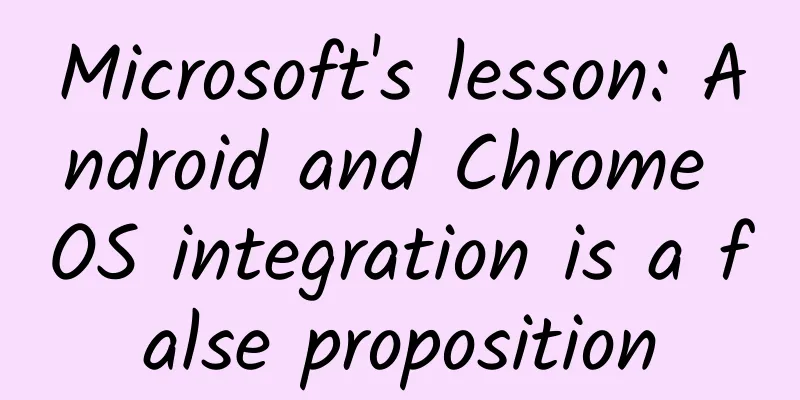Microsoft's lesson: Android and Chrome OS integration is a false proposition

|
Recently, the Wall Street Journal reported that Google plans to merge Android and Chrome OS and officially launch the merged operating system in 2017. The merged operating system supports both desktop and mobile terminals, and the application store is Google Play. However, shortly after this report, a Google official spokesperson denied it and said that Chrome OS and Android will coexist and Chrome OS will not disappear. So the question is, will Android and Chrome OS merge in the future or will they exist and develop independently? What are the determining factors? When it comes to the merger or integration of operating systems, the first thing that comes to mind in the industry is Microsoft's recently released Windows 10 system. In fact, as early as the previous Windows 8, Microsoft had already embarked on its so-called system integration journey. Although Microsoft claims that this is done to provide users with a unified experience on different devices such as PCs, tablets and smartphones, given that Microsoft's Windows system has an extremely low market share in smartphones and tablets, especially smartphones, Microsoft's main strategic intention for system integration was to use Windows' advantages in the traditional PC market (ecosystem, brand influence, etc.) to feed back to the smartphone and tablet markets, that is, to increase the market share of the Windows ecosystem in these two markets. Unfortunately, instead of feeding back the market, Windows 8 reduced the PC experience of traditional PC users, which ultimately led to the failure of its other role in stimulating the depressed PC market, resulting in a "losing the rice while trying to steal the chicken" outcome. Let's take a look at the rumored merger of Google Android and Chrome OS. Industry insiders familiar with Chrome OS know that the core purpose of Google's launch of Chrome OS is to make it the Android of the PC industry (in 2013, Patrick Pichette, Google's CFO and senior vice president, once said: In the future, I hope Chrome OS can shine on the PC platform like Android.). But just like Microsoft's market share in the smartphone market is only about 3%, which symbolizes its presence, Google Chrome OS is even more dominant in the traditional PC market, with almost no ecosystem. Although Chromebooks (notebooks) using the Chrome OS system have won some market share among education and school users in recent years with their low prices (currently around 3%), from the perspective of the larger enterprise market, the corporate awareness and adoption intention of Chromebooks are quite low. According to a Forrester survey, 73% of people have no interest in Chromebooks at all, and among the 27% who are interested, only 4% plan to deploy them. Gartner predicts that by 2017, although Chromebook sales will nearly triple to 14.4 million units, Chromebook notebooks will still be a niche market in the next five years. From this, we can see that, whether now or in the future, the role and function of Chrome OS in the PC market is the same as that of Microsoft Windows in the smartphone market, which is just to show its presence without any commercial value. This is also the main reason why there are several rumors in the industry that Google wants to merge Android, which has an absolute advantage in the mobile market, with Chrome OS, or more precisely, to integrate Chrome OS into Android. That is, to use the already formed and market-dominant Android ecosystem to feed back the Chrome OS, which lacks an ecosystem in the PC market. This is similar to the strategy we mentioned earlier that Microsoft hopes to use the Windows ecosystem in the PC market to feed back its lack of ecosystem in the smartphone market. Both are about extending the superior ecosystem in their respective industries to the weaker ecosystem in the name of cross-device unified user experience. However, for Google, its Android in the mobile market is the Windows in Microsoft PC, and Chrome OS is the Windows Phone in Microsoft's previous mobile market. However, from now on, Microsoft's strategy has not produced any substantial market effect, especially in feeding back Microsoft's sales of smartphones based on Windows 8. Although Microsoft's recently released Windows 10 has received good reviews from the industry, from the current perspective, it has performed well in the PC market, which is the core of Microsoft Windows, only because of its free upgrade strategy. This is also due to the fact that Microsoft has learned the lesson that Windows 8 did not pay attention to the traditional PC user experience. In other words, the starting point of Windows 10 is still to focus on PC experience or to innovate in improving PC experience. As for how it will perform in the weak smartphone market, it is still unknown. Some people may say that there is no direct comparability between Microsoft's system and the rumored Google system. However, through the above comparison, we believe that the integration of Google's Android and Chrome OS is highly similar to the integration of Microsoft's Windows. That is, both hope to use the established and dominant ecosystem in their respective industries to exert influence and expand another ecosystem that is almost marginalized, but both sides inevitably face the challenge of balancing technology, ecology and experience. Specifically, for Google Android and Chrome OS, if they move towards integration in the future, like Windows, they must not only take into account their experience in the smartphone (including tablet) ecosystem, but also consider improving their experience in the PC ecosystem, at least higher than the previous Chrome OS, otherwise there is no need and value for integration. However, judging from the fact that the dual-system PCs (Windows and Android) released by traditional PC manufacturers have not made any waves in the PC market, and have even come to nothing, the industry's claim that Android's strong ecosystem in smartphones may help improve its competitiveness in the PC market seems to have failed to gain recognition from PC users. This has forced Google to face the same choice of experience balance as Microsoft in future system integration, that is, whether to focus on smartphones or PCs. If it focuses on PCs, it will be like Microsoft's previous Windows 8, which will take over the main experience and harm the experience of its core smartphone users. If it focuses on smartphones, the improvement of the already fragile PC ecosystem (Chrome OS) and experience will be very limited, or even useless. Then some people will question, is there no way to balance? Here we might as well quote Apple CEO Tim Cook's explanation at the Boxworks conference in San Francisco about why Apple will not merge iOS and OS X: We do not believe that PCs and mobile devices should use the same operating system, and these operating systems should provide different functions. We have no plans to integrate. Do you understand the difficulty of balance? Two different markets, functions, users and experiences must be taken into account and satisfied with one system. This is not only a challenge to ourselves, but also a challenge to the market and users. It is not impossible, but it is unrealistic or the risks are far greater than the opportunities. Perhaps it is because of the previous aggressiveness of Microsoft's Windows fusion system (Windows 8 focused on the user experience of smartphones, but failed to achieve substantial market results, and instead damaged the experience of traditional core PC users) and the return of Windows 10 (correcting the aggressiveness of Windows 8 and focusing on the experience of traditional PC users), Google believes that the fusion of Android and Chrome OS is nothing more than a replay of Microsoft's Windows fusion, so it denied the rumors of fusion and insisted that the two systems will coexist in the future, because whether it is fusion or independence, Android's advantage is still in the mobile smartphone market, and it will be difficult to make a big change in the PC market, let alone shake Microsoft's position in this market. In this case, the fusion of Google Android and Chrome OS has become a complete pseudo-***, because whether it is fusion or not, the result is the same. |
<<: BlackBerry's swan song - Priv phone will be launched this week
>>: 2015 Q3 Mobile Game Market Analysis Report
Recommend
New vulnerability: One song can compromise all Android devices
Security researchers at Zimperium zLabs have disc...
Useful information | A guide to Weibo Fans Channel placement in the education industry!
The online education industry is booming, and mar...
Dopamine: Not just a happiness carrier, but also a savior for dementia?
Dopamine's many roles: from everyday pleasure...
What is invisible secondary pollution?
How do you define whether your home is clean if y...
How to accurately classify users and reduce promotion costs?
In marketing promotion , if target users are simp...
The iron tree finally blooms, which is much more difficult than "the iron tree blooms"!
Recently, the news that a very small wild plant s...
Drinking soup before meals can keep you slim and healthy? Drinking it right can help you lose weight, but drinking it wrong can lead to 4 negative effects
When the food was served, I was about to pick up ...
#千万IP创科普# Emergency Science Popularization | Picture caption: Do you know these precautions after a typhoon?
Emergency Science | Illustration: Do you know the...
It is a disease, but we have seriously ignored it...
There is a disease, You may not know it is a dise...
3 strategies for marketing growth in 2020!
Growth is a double-edged sword. It can solve many...
Helio X25 is not powerful enough? Is Meizu PRO 6 considered a high-end flagship?
Many people say that because of the Meizu Blue No...
Do you know how the Segway boss died? Balance bikes are still a little bit behind in their road use
As a means of transportation that combines fashio...
"Scientific management is the way to govern the country" - Remembering Academician Wang Yingluo, the founder of my country's system management discipline
Academician Wang Yingluo (1930-2023) On the eveni...
The new Landwind Xiaoyao has a mature and youthful appearance design and is priced at RMB 79,900 to RMB 131,900.
On the evening of January 4, Landwind's new c...
Top 10 Excellent H5 Marketing Cases in the Financial Industry in 2016
Every once in a while, an H5 will go viral on our...

![[Visualization] How was my country's "Julang-1" solid-fuel strategic ballistic missile born?](/upload/images/67f257414bfa8.webp)







